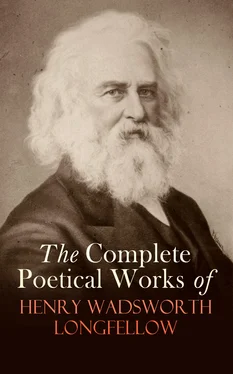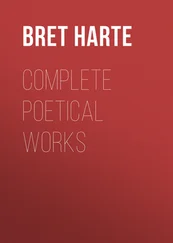That words are powerless to express,
And leave it still unsaid in part,
Or say it in too great excess.
The very tones in which we spake
Had something strange, I could but mark;
The leaves of memory seemed to make
A mournful rustling in the dark.
Oft died the words upon our lips,
As suddenly, from out the fire
Built of the wreck of stranded ships,
The flames would leap and then expire.
And, as their splendor flashed and failed,
We thought of wrecks upon the main,
Of ships dismasted, that were hailed
And sent no answer back again.
The windows, rattling in their frames,
The ocean, roaring up the beach,
The gusty blast, the bickering flames,
All mingled vaguely in our speech.
Until they made themselves a part
Of fancies floating through the brain,
The long-lost ventures of the heart,
That send no answers back again.
O flames that glowed! O hearts that yearned!
They were indeed too much akin,
The drift-wood fire without that burned,
The thoughts that burned and glowed within.
Table of Contents
Table of Contents
There is no flock, however watched and tended,
But one dead lamb is there!
There is no fireside, howsoe'er defended,
But has one vacant chair!
The air is full of farewells to the dying,
And mournings for the dead;
The heart of Rachel, for her children crying,
Will not be comforted!
Let us be patient! These severe afflictions
Not from the ground arise,
But oftentimes celestial benedictions
Assume this dark disguise.
We see but dimly through the mists and vapors;
Amid these earthly damps
What seem to us but sad, funereal tapers
May be heaven's distant lamps.
There is no Death! What seems so is transition;
This life of mortal breath
Is but a suburb of the life elysian,
Whose portal we call Death.
She is not dead—the child of our affection—
But gone unto that school
Where she no longer needs our poor protection,
And Christ himself doth rule.
In that great cloister's stillness and seclusion,
By guardian angels led,
Safe from temptation, safe from sin's pollution,
She lives, whom we call dead.
Day after day we think what she is doing
In those bright realms of air;
Year after year, her tender steps pursuing,
Behold her grown more fair.
Thus do we walk with her, and keep unbroken
The bond which nature gives,
Thinking that our remembrance, though unspoken,
May reach her where she lives.
Not as a child shall we again behold her;
For when with raptures wild
In our embraces we again enfold her,
She will not be a child;
But a fair maiden, in her Father's mansion,
Clothed with celestial grace;
And beautiful with all the soul's expansion
Shall we behold her face.
And though at times impetuous with emotion
And anguish long suppressed,
The swelling heart heaves moaning like the ocean,
That cannot be at rest—
We will be patient, and assuage the feeling
We may not wholly stay;
By silence sanctifying, not concealing,
The grief that must have way.
Table of Contents
All are architects of Fate,
Working in these walls of Time;
Some with massive deeds and great,
Some with ornaments of rhyme.
Nothing useless is, or low;
Each thing in its place is best;
And what seems but idle show
Strengthens and supports the rest.
For the structure that we raise,
Time is with materials filled;
Our to-days and yesterdays
Are the blocks with which we build.
Truly shape and fashion these;
Leave no yawning gaps between;
Think not, because no man sees,
Such things will remain unseen.
In the elder days of Art,
Builders wrought with greatest care
Each minute and unseen part;
For the Gods see everywhere.
Let us do our work as well,
Both the unseen and the seen;
Make the house, where Gods may dwell,
Beautiful, entire, and clean.
Else our lives are incomplete,
Standing in these walls of Time,
Broken stairways, where the feet
Stumble as they seek to climb.
Build to-day, then, strong and sure,
With a firm and ample base;
And ascending and secure
Shall to-morrow find its place.
Thus alone can we attain
To those turrets, where the eye
Sees the world as one vast plain,
And one boundless reach of sky.
SAND OF THE DESERT IN AN HOUR-GLASS
Table of Contents
A handful of red sand, from the hot clime
Of Arab deserts brought,
Within this glass becomes the spy of Time,
The minister of Thought.
How many weary centuries has it been
About those deserts blown!
How many strange vicissitudes has seen,
How many histories known!
Perhaps the camels of the Ishmaelite
Trampled and passed it o'er,
When into Egypt from the patriarch's sight
His favorite son they bore.
Perhaps the feet of Moses, burnt and bare,
Crushed it beneath their tread;
Or Pharaoh's flashing wheels into the air
Scattered it as they sped;
Or Mary, with the Christ of Nazareth
Held close in her caress,
Whose pilgrimage of hope and love and faith
Illumed the wilderness;
Or anchorites beneath Engaddi's palms
Pacing the Dead Sea beach,
And singing slow their old Armenian psalms
In half-articulate speech;
Or caravans, that from Bassora's gate
With westward steps depart;
Or Mecca's pilgrims, confident of Fate,
And resolute in heart!
These have passed over it, or may have passed!
Now in this crystal tower
Imprisoned by some curious hand at last,
It counts the passing hour,
And as I gaze, these narrow walls expand;
Before my dreamy eye
Stretches the desert with its shifting sand,
Its unimpeded sky.
And borne aloft by the sustaining blast,
This little golden thread
Dilates into a column high and vast,
A form of fear and dread.
And onward, and across the setting sun,
Across the boundless plain,
The column and its broader shadow run,
Till thought pursues in vain.
The vision vanishes! These walls again
Shut out the lurid sun,
Shut out the hot, immeasurable plain;
The half-hour's sand is run!
Table of Contents
The old house by the lindens
Stood silent in the shade,
And on the gravelled pathway
The light and shadow played.
I saw the nursery windows
Wide open to the air;
But the faces of the children,
They were no longer there.
The large Newfoundland house-dog
Was standing by the door;
He looked for his little playmates,
Who would return no more.
They walked not under the lindens,
They played not in the hall;
But shadow, and silence, and sadness
Were hanging over all.
The birds sang in the branches,
With sweet, familiar tone;
But the voices of the children
Will be heard in dreams alone!
And the boy that walked beside me,
He could not understand
Why closer in mine, ah! closer,
I pressed his warm, soft hand!
KING WITLAF'S DRINKING-HORN
Table of Contents
Witlaf, a king of the Saxons,
Ere yet his last he breathed,
To the merry monks of Croyland
His drinking-horn bequeathed—
Читать дальше












